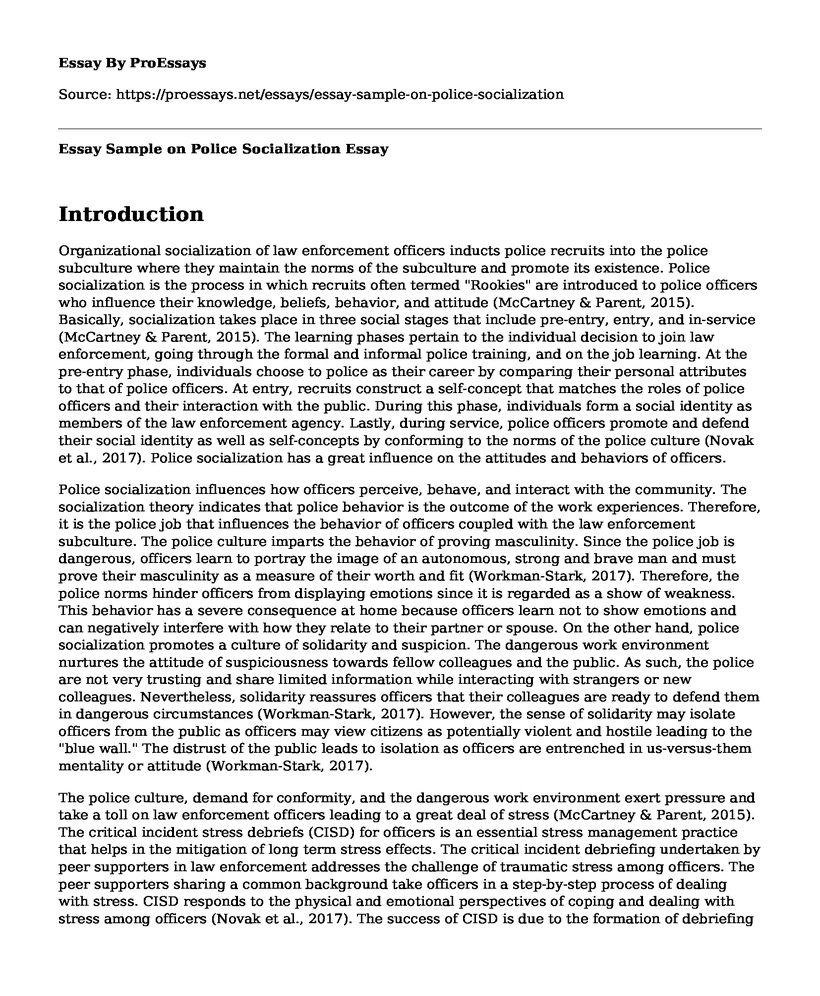Introduction
Organizational socialization of law enforcement officers inducts police recruits into the police subculture where they maintain the norms of the subculture and promote its existence. Police socialization is the process in which recruits often termed "Rookies" are introduced to police officers who influence their knowledge, beliefs, behavior, and attitude (McCartney & Parent, 2015). Basically, socialization takes place in three social stages that include pre-entry, entry, and in-service (McCartney & Parent, 2015). The learning phases pertain to the individual decision to join law enforcement, going through the formal and informal police training, and on the job learning. At the pre-entry phase, individuals choose to police as their career by comparing their personal attributes to that of police officers. At entry, recruits construct a self-concept that matches the roles of police officers and their interaction with the public. During this phase, individuals form a social identity as members of the law enforcement agency. Lastly, during service, police officers promote and defend their social identity as well as self-concepts by conforming to the norms of the police culture (Novak et al., 2017). Police socialization has a great influence on the attitudes and behaviors of officers.
Police socialization influences how officers perceive, behave, and interact with the community. The socialization theory indicates that police behavior is the outcome of the work experiences. Therefore, it is the police job that influences the behavior of officers coupled with the law enforcement subculture. The police culture imparts the behavior of proving masculinity. Since the police job is dangerous, officers learn to portray the image of an autonomous, strong and brave man and must prove their masculinity as a measure of their worth and fit (Workman-Stark, 2017). Therefore, the police norms hinder officers from displaying emotions since it is regarded as a show of weakness. This behavior has a severe consequence at home because officers learn not to show emotions and can negatively interfere with how they relate to their partner or spouse. On the other hand, police socialization promotes a culture of solidarity and suspicion. The dangerous work environment nurtures the attitude of suspiciousness towards fellow colleagues and the public. As such, the police are not very trusting and share limited information while interacting with strangers or new colleagues. Nevertheless, solidarity reassures officers that their colleagues are ready to defend them in dangerous circumstances (Workman-Stark, 2017). However, the sense of solidarity may isolate officers from the public as officers may view citizens as potentially violent and hostile leading to the "blue wall." The distrust of the public leads to isolation as officers are entrenched in us-versus-them mentality or attitude (Workman-Stark, 2017).
The police culture, demand for conformity, and the dangerous work environment exert pressure and take a toll on law enforcement officers leading to a great deal of stress (McCartney & Parent, 2015). The critical incident stress debriefs (CISD) for officers is an essential stress management practice that helps in the mitigation of long term stress effects. The critical incident debriefing undertaken by peer supporters in law enforcement addresses the challenge of traumatic stress among officers. The peer supporters sharing a common background take officers in a step-by-step process of dealing with stress. CISD responds to the physical and emotional perspectives of coping and dealing with stress among officers (Novak et al., 2017). The success of CISD is due to the formation of debriefing teams and the implementation of confidentiality rules that protect the privacy of participating officers.
Conclusion
In conclusion, the introduction and conformity of the police subculture is the process of socialization in law enforcement. Police socialization has an impact on the attitudes and behavior of officers. The norms of the subculture influence police attitudes in relation to family members and the public. The police working environment is dangerous and the pressure of the subculture leads to stress. The critical incident debriefing is a fundamental aspect of managing the long term effects of stress and has been successful because it is carried out by peer support teams.
References
McCartney, S., & Parent, R. (2015). Ethics in law enforcement. Victoria, British Columbia: BCcampus, BC Open Textbook Project.
Novak, K. J., Cordner, G. W., Smith, B. W., & Roberg, R. R. (2017). Police & society. New York: Oxford University Press.
Workman-Stark, A. L. (2017). Inclusive Policing from the Inside Out. Basingstoke, England: Springer.
Cite this page
Essay Sample on Police Socialization. (2022, Dec 05). Retrieved from https://proessays.net/essays/essay-sample-on-police-socialization
If you are the original author of this essay and no longer wish to have it published on the ProEssays website, please click below to request its removal:
- UAE Changes in Transportation Before 60 Years Paper Example
- Essay Example on Police Nab Suspect in Overnight Taco Bell Break-In
- Buying a Car: Essential for Business & Personal Use - Essay Sample
- Community Policing: Enhancing Quality and Safety of Neighborhoods With Public Participation - Research Paper
- Maximizing Comp. Competitiveness: Exploiting the Asian Auto Market - Essay Sample
- Paper Example on Police Killing Netizens: The Resistencia Phenomenon
- Essay on Police Searches & Seizures: The Balance Between Civil Liberties & Society







